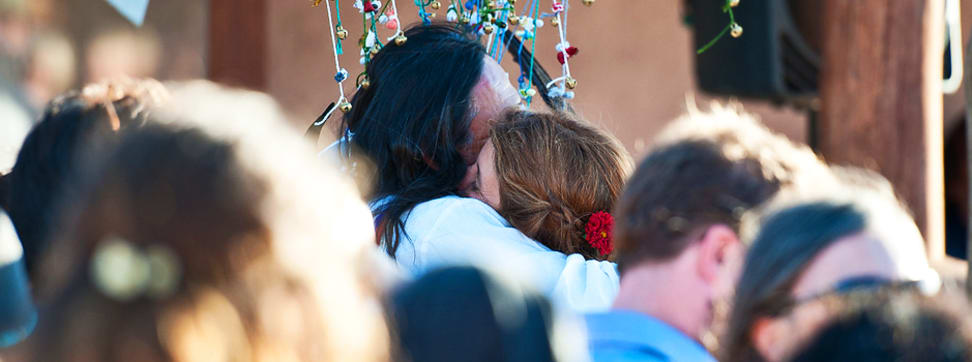Friends Ask You to Shoot Their Wedding: What Do You Do?
Short answer? Unless you're a pro, just say no.
 Credit:
Ben Keough
Credit:
Ben Keough
Products are chosen independently by our editors. Purchases made through our links may earn us a commission.
Maybe it'll be their kid's t-ball game. Maybe some architectural shots of a house they're trying to sell. Maybe some pet portraits.
It might be your mom asking. It might be a family friend. It might be a coworker. It might even be your boss. (Ouch.)
If you've got the appropriate gear and a reasonable number of exposures under your belt, you might feel comfortable accepting some of these assignments. After all, they're a good way to put your skills to the test. And if it turns out you're not up to the task, there's no real harm done: There are a lot of games in a t-ball season, that house isn't going anywhere, and the pets won't mind posing again. But there's one request that ought to put the fear of god in any self-aware photo enthusiast:
"Could I convince you to shoot my wedding?"

Wedding photography is, to put it simply, the most stressful, most demanding kind of photography you can do without setting foot in an actual war zone. You have precisely one chance to capture each crucial moment of the prep, ceremony, and reception—moments the bride, the groom, and their parents will hope to cherish for the rest of their lives. It's not a task for amateurs.
So, what do you do when someone you care about asks you to take on such a colossal responsibility?
If you're a good friend, you say no.
Say it as gently and apologetically as you need to, but just say no.
That's not as easy as it sounds. Because it's your friend, or your sister, or someone you owe a favor, you're naturally going to feel a lot of pressure to say yes. But "yes" is almost never the right answer—shooting a friend's wedding is virtually always a terrible idea. Here's why:
1. You are not a professional. (And if you are, this article isn't for you.)
Most successful professional wedding photographers either apprenticed as assistants or second shooters for established pros, or taught themselves through years of practice (and probably made plenty of mistakes along the way). They know all the tricks required to get the shots that couples and their families covet. They have all the gear. They have backups for all the gear. They have assistants. They have the people skills necessary to organize raucous groups of inebriated wedding guests into perfectly posed group shots. They know how to blend into the background to capture those spontaneous, intimate moments. They know flash photography like the back of their hand, and also know how to get the best results in places flashes can’t go. Unless you're a pro, you probably can't say the same.
2. Shooting a wedding for free is taking work away from professionals.
Opinions vary on this one, even among actual pros, but there's no denying that professional photography is a difficult business. The best photographers can make a good living at it, but the hours are long and unpredictable. Virtually all photographers work on a freelance basis, and work can dry up without warning. If your friends can afford to hire a pro, but ask you to fill in to "save a few bucks," you should say no. Chances are, they'd come to regret their decision down the road, and you'd be taking business away from someone who needs and deserves it.
3. Weddings are supposed to be fun, but shooting them is work. Hard work.
This may sound like a selfish point, but your friends' wedding isn't just about the bride and groom. The event is a celebration of their life together, and a party thrown for everyone who has helped get them to this moment. That means you. Your friends are important to you, and the moment probably is, too. You deserve the opportunity to eat, drink, and be merry. You shouldn’t be sweating at the end of a long lens barrel.
You may have the idea that you can shoot the wedding, but keep it laid-back and casual. You know… hang out, eat some cake, drink a beer or two, grab some party shots and spontaneous portraits. The bride and groom might even encourage the notion. But for most wedding photographers, that idea evaporates as soon as the family arrives and stress begins to rise. Your friends might be cool, but what about the bride’s insane mother or the groom's drunk uncle? What happens when you start getting conflicting orders from rival factions? It can become a bad scene faster than you'd believe.
4. The personal repercussions of a botched wedding shoot can be dramatic.
If a professional makes a hash of shooting a wedding, it's their professional relationship that's on the line. There's a contract to fall back on: Money can be refunded, formal apologies can be issued, and the unpleasant business can be finished, if not forgotten. But if you get in over your head trying to shoot your friends' wedding, the only thing you have to lose is your personal relationship. Are you willing to risk losing friends you've known for years if you inadvertently ruin their wedding day? It might sound absurd, but you'd be surprised how easily this can happen.

But even with all these reasons to stay far, far away from the camera, there's still going to be a part of you that's tempted to say yes. How do I know? Because I've been in that position, and I've succumbed. I've attended several weddings as a second shooter and handled one as the primary photographer. Yep, guilty.
In my defense, I did it for the one good reason someone might do such a thing: My friends simply couldn't afford anyone better.
There's a legitimate difference between cutting corners and having no corners to cut, and when your friends are scraping the bottom of their bank account, a good friend can—and some would argue should—step in. But even in this scenario, you should play it safe. Sit down with your friends, talk about what coverage they want and what they can expect from you, and get everything in writing. (This sounds silly for a deal between friends, but trust me: just do it.)
If they do have some small amount of money to offer you, don't be ashamed to accept it; it's going to be real work, if you do it right. You might think processing the photos might take just a day, maybe two, but if you do it right you’re looking at untold hours planted in front of your Adobe Lightroom install while they’re off on their honeymoon. And what will you get for your trouble? A crick in your neck and a heartfelt thank-you on Facebook.
If none of this sounds very attractive to you, there other alternatives you could suggest to cash-strapped friends—most involving crowdsourcing. They could buy a crate of disposable film cameras and hand them out to the guests. They could encourage attendees to bring their own cameras and set up a laptop with a card reader to collect everyone's work. Or they could set up a Flickr group for post-wedding uploads.
My brief career as a wedding photographer wasn't a disaster. The shots were acceptable—maybe even good—and I'm still on speaking terms with the bride and groom, though they moved out of the country shortly after the wedding. (Coincidence?) Even so, I can't recommend anyone follow in my footsteps. If you love shooting and don't have dreams of making a living with your camera, just keep on doing what you're doing. Photography is too enjoyable a hobby to ruin with unnecessary stress.
